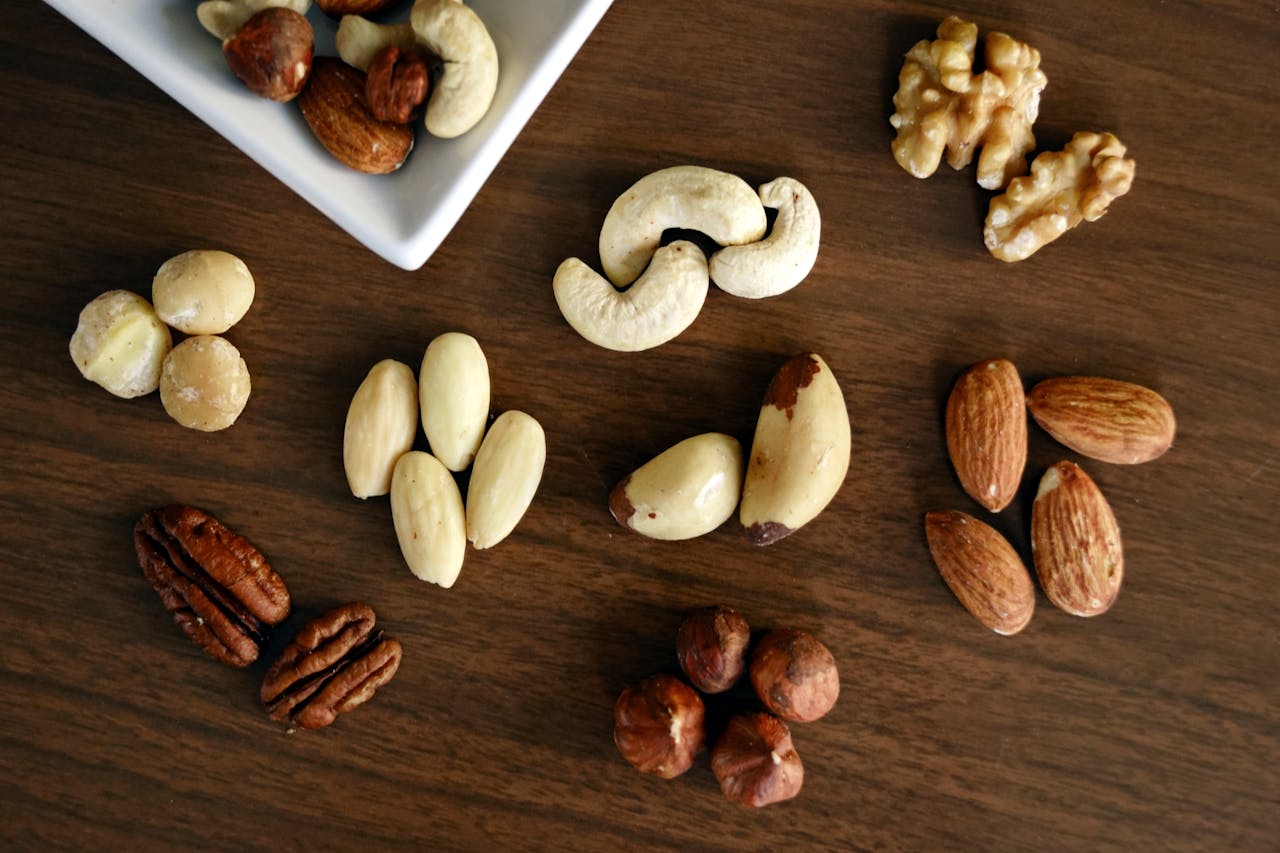Nuts are not only a tasty snack, but also a wealth of nutrients with health benefits. They are a source of unsaturated fatty acids, vegetable protein, fiber, vitamins (especially E and B vitamins) and minerals such as magnesium, zinc, selenium and iron. Regular consumption of nuts can support cardiovascular function, lower “bad” LDL cholesterol, stabilize blood sugar levels, and even have a protective effect on the brain and nervous system.
While all nuts are a valuable component of the diet, some stand out for their special health properties.
Walnuts
Walnuts are one of the richest plant sources of omega-3 fatty acids. They also contain polyphenols and other bioactive compounds that support cardiovascular health. Their regular consumption can favorably influence the blood lipid profile and support brain function.
Almonds
Almonds are particularly rich in vitamin E, which acts as an antioxidant and protects cells from oxidative stress. They also provide magnesium, fiber and healthy monounsaturated fats. Including almonds in your diet can have a positive impact on heart health and help maintain a healthy body weight.
Pistachios
Pistachios are slightly lower in calories than other nuts and are high in protein and fiber. They also contain lutein, important for eye health. Thanks to the presence of phytosterols, they can help maintain normal cholesterol levels.
Brazil nuts
Brazil nuts are distinguished by their very high selenium content – just one to two pieces a day can cover the need for this element. Selenium plays a key role in the work of the thyroid gland and in protecting the body from oxidative stress. Due to its high content, however, it is necessary to exercise moderation in their consumption.
Cashew nuts
Nuts Cashew nuts have a slightly lower fat content than other nuts, but are rich in copper, zinc and iron. They support immune function, participate in collagen formation and help maintain healthy skin. Their mild flavor makes them popular in both dry cuisine and desserts.
Peanuts
Although peanuts belong to legumes, their nutritional value and use in the diet are similar to classic nuts. They are a good source of protein, B vitamins and unsaturated fatty acids. It is worth choosing unsalted and unroasted versions to avoid excess salt and trans fats.
Conclusions
It’s impossible to point to one type of nut as the healthiest, as each has a unique composition and nutritional properties. The best solution is to include different kinds of nuts in the diet, in moderate amounts. The daily portion, recommended by nutritionists, is about 30 grams. Consumed regularly, as part of a balanced diet, nuts can promote health and prevent many chronic diseases.
You can learn more here:
- Bao, Y., Han, J., Hu, F. B., Giovannucci, E. L., Stampfer, M. J., Willett, W. C., & Fuchs, C. S. (2013). Association of nut consumption with total and cause-specific mortality. New England Journal of Medicine, 369(21), 2001–2011.
- Banel, D. K., & Hu, F. B. (2009). Effects of walnut consumption on blood lipids and other cardiovascular risk factors: a meta-analysis and systematic review. American Journal of Clinical Nutrition, 90(1), 56–63.
- Jenkins, D. J. A., Kendall, C. W. C., Marchie, A., et al. (2002). Dose response of almonds on coronary heart disease risk factors: blood lipids, oxidized low-density lipoproteins, lipoprotein(a), and C-reactive protein. Circulation, 106(11), 1327–1332.
- Gulati, S., Misra, A., Pandey, R. M. (2018). Effect of pistachio nuts on body weight and lipid levels: A systematic review and meta-analysis. Nutrition Reviews, 76(8), 591–605.
- Thomson, C. D., Chisholm, A., McLachlan, S. K., & Campbell, J. M. (2008). Brazil nuts: an effective way to improve selenium status. American Journal of Clinical Nutrition, 87(2), 379–384.
- Alasalvar, C., & Bolling, B. W. (2015). Review of nut phytochemicals, fat-soluble bioactives, antioxidant components and health effects. British Journal of Nutrition, 113(S2), S68–S78.
- O’Neil, C. E., Keast, D. R., Nicklas, T. A., & Fulgoni, V. L. (2011). Nut consumption is associated with decreased health risk factors for cardiovascular disease and metabolic syndrome in US adults: NHANES 1999–2004. Journal of the American College of Nutrition, 30(6), 502–510.

